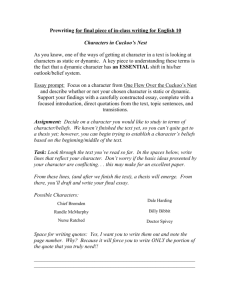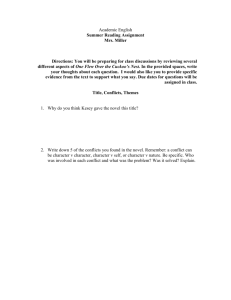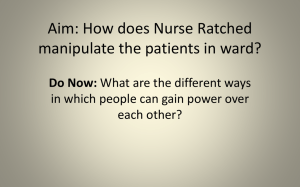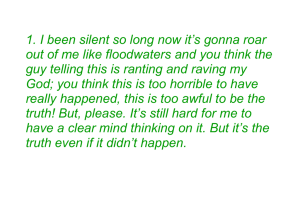Sparks Notes – Available on the school intranet in full
advertisement
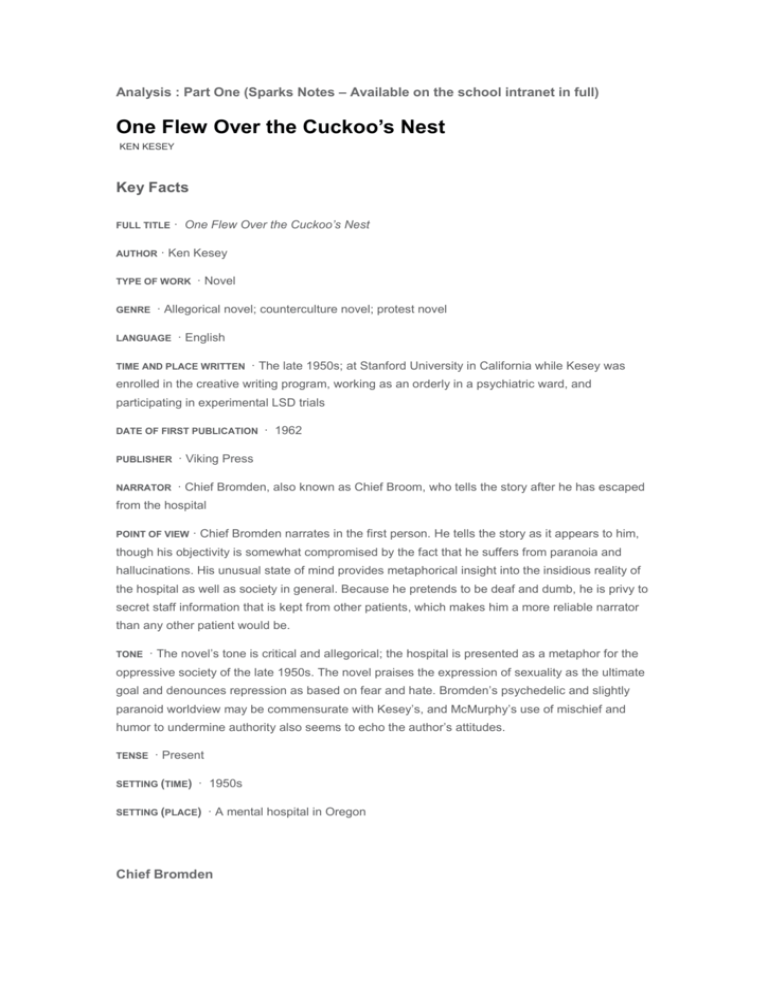
Analysis : Part One (Sparks Notes – Available on the school intranet in full) One Flew Over the Cuckoo’s Nest KEN KESEY Key Facts FULL TITLE AUTHOR · One Flew Over the Cuckoo’s Nest · Ken Kesey TYPE OF WORK GENRE · Novel · Allegorical novel; counterculture novel; protest novel LANGUAGE · English TIME AND PLACE WRITTEN · The late 1950s; at Stanford University in California while Kesey was enrolled in the creative writing program, working as an orderly in a psychiatric ward, and participating in experimental LSD trials DATE OF FIRST PUBLICATION · 1962 PUBLISHER · Viking Press NARRATOR · Chief Bromden, also known as Chief Broom, who tells the story after he has escaped from the hospital POINT OF VIEW · Chief Bromden narrates in the first person. He tells the story as it appears to him, though his objectivity is somewhat compromised by the fact that he suffers from paranoia and hallucinations. His unusual state of mind provides metaphorical insight into the insidious reality of the hospital as well as society in general. Because he pretends to be deaf and dumb, he is privy to secret staff information that is kept from other patients, which makes him a more reliable narrator than any other patient would be. TONE · The novel’s tone is critical and allegorical; the hospital is presented as a metaphor for the oppressive society of the late 1950s. The novel praises the expression of sexuality as the ultimate goal and denounces repression as based on fear and hate. Bromden’s psychedelic and slightly paranoid worldview may be commensurate with Kesey’s, and McMurphy’s use of mischief and humor to undermine authority also seems to echo the author’s attitudes. TENSE · Present SETTING (TIME) · 1950s SETTING (PLACE) · A mental hospital in Oregon Chief Bromden Chief Bromden, nicknamed “Chief Broom” because the aides make him sweep the halls, narrates One Flew Over the Cuckoo's Nest. Although he says that he is telling the story about “the hospital, and her, and the guys—and about McMurphy,” he is also telling the story of his own journey toward sanity. When the novel begins, Bromden is paranoid, bullied, and surrounded much of the time by a hallucinated fog that represents both his medicated state and his desire to hide from reality. Moreover, he believes that he is extremely weak, even though he used to be immensely strong; because he believes it, he is extremely weak. By the end of the novel, the fog has cleared, and Bromden has recovered the personal strength to euthanize McMurphy, escape from the hospital, and record his account of the events. Bromden is six feet seven inches tall, but because he has been belittled for so long, he thinks he “used to be big, but not no more.” He has been a patient in an Oregon psychiatric hospital for ten years. Everyone in the hospital believes that he is deaf and dumb. When McMurphy begins to pull him out of the fog, he realizes the source of his charade: “it wasn't me that started acting deaf; it was people that first started acting like I was too dumb to hear or see or say anything at all.” As Bromden himself is demystified, so too is the truth behind what has oppressed him and hindered his recovery. This oppression has been in place since Bromden's childhood. He is the son of Chief Tee Ah Millatoona, which means The Pine That Stands Tallest on the Mountain, and a white woman, Mary Louise Bromden, the dominant force in the couple. Chief Bromden bears his mother's last name; his father's acceptance of her name symbolizes her dominance over him. In one telling experience, when -Bromden was ten years old, three government officials came to see his father about buying the tribe's land so they could build a hydroelectric dam, but Bromden was home alone. When he tried to speak to the officials, they acted as if he was not there. This experience sows the seeds for his withdrawal into himself, and initiates the outside world's treatment of him as if he were deaf and dumb. Bromden's mother joined forces with some of the members of the tribe to pressure Bromden's father to sell the land. Bromden, like his father, is a big man who comes to feel small and helpless. The reason for Bromden's hospitalization is cloaked in ambiguity. He may have had a breakdown from witnessing the decline of his father or from the horrors of fighting in World War II. Both of these possible scenarios involve an emasculating and controlling authority—in the first case the government officials, in the second the army. These authority figures provide Bromden with fodder for his dark vision of society as an oppressive conglomeration that he calls the Combine. It is also possible that, like McMurphy, Bromden was sane when he entered the hospital but that his sanity slipped when he received what is rumored to be 200 electroshock treatments. The paranoia and hallucinations he suffers from, which center on hidden machines in the hospital that physically and psychologically control the patients, can be read as metaphors for the dehumanization he has experienced in his life. Chief Bromden, the narrator of One Flew Over the Cuckoo's Nest, is a complex character whose own story is revealed as he tells the story of the ward at large. Because he feigns deafness, he is privy to information that is kept from the other patients. In this way, he is a more informed narrator than any other patient. However, -Bromden's reliability as a narrator is unclear because we constantly see reminders of his psychological disorder. The main indications of his illness are paranoia and frequent hallucinations. His paranoia is often justified, as the patients are indeed treated barbarically. But his hallucinations, though they seem crazy at first, metaphorically reveal his deep, intuitive understanding of his surroundings. For example, the fog machine he hallucinates represents his state of mind—he is overmedicated or simply too fearful to face the stark reality beyond the fog. The fog machine also represents the powerlessness of the patients, who are encouraged and sometimes forced by the staff to stay hidden in their own individual fogs. Bromden sees modern society as a machinelike, oppressive force, and the hospital as a repair shop for the people who do not fit into their role as cogs in the machine. Bromden's way of interpreting the world emphasizes the oppressive social pressure to conform: those who do not conform to society's rules and conventions are considered defective products and are labeled mentally ill and sent for treatment. Thus, the mental hospital is a metaphor for the oppression Kesey sees in modern society, preceding the emergence of the 1960s counterculture. A hospital, normally a place where the ill go to be cured, becomes a dangerous place; Ellis, Ruckly, and Taber, for instance, are electroshocked until they become docile or even vegetables. The hospital is not about healing, but about dehumanizing and manipulating the patients until they are weak and willing to conform. At the center of this controlled universe is Nurse Ratched, a representative of what Bromden calls the Combine, meaning the oppressive force of society and authority. Bromden describes her in mechanical, inhuman terms. She tries to conceal her large breasts as much as possible, and her face is like that of a doll, with a subtle edge of cruelty. Bromden imagines that the hospital is full of hidden machinery— wires, magnets, and more sinister contraptions—used by Nurse Ratched to control the patients. The nurse is, in fact, in complete control of the ward, and the tools she uses—psychological intimidation, divide-and-conquer techniques, and physical abuse—are every bit as powerful and insidious as the hidden machinery -Bromden imagines. Immediately upon his arrival, McMurphy challenges the ward with his exuberant vitality and sexuality, which are directly opposed to the sterile, mechanical nature of the hospital and modern society. He is set up as an obvious foil to Nurse Ratched, as well as to the silent and repressed Bromden. McMurphy's discussion with Harding reveals the misogynistic undertones of One Flew Over the Cuckoo's Nest. The patients associate matriarchy with castration, explaining the lifelessness and oppressiveness of modern society as a product of female dominance. Bromden's reliability as a narrator becomes clear as we realize how incredibly observant he is. Unlike the other patients, Bromden notices how carefully McMurphy sets them up to lose their cigarettes. Moreover, Bromden's bizarre dream about Old Blastic turns out to be prophetic, demonstrating that his altered states of perception are significant rather than simply crazy. Bromden perceives the hospital not as a place promoting health but as a mechanized slaughterhouse where not only humans, but also humanity, is murdered. Old Blastic is hung on a meat hook and disemboweled, but rust and ash pour from his wound rather than flesh and blood. -Bromden's dreams metaphorically reveal his profound insight into the dehumanizing and mechanizing forces of the hospital. Bromden's hallucination that he is surrounded by fog extends to the other patients—he thinks that they are lost in fog too. This is clearly a delusion, but metaphorically it is true. The status quo enforced by Nurse Ratched functions to dull the patients' senses. Her tight routine makes everything seem to move either too slow or too fast. The too-loud music makes conversation difficult and frustrating. In response to the ever-extending fog, or a clouding of one's unique thoughts and needs, Bromden describes McMurphy's actions as dragging the patients out of the fog. By resisting Ratched, McMurphy awakens the patients to their own ability to resist her, and thereby helps them see beyond the fog. Bromden at first does not attribute his rebellious vote to his own willpower, but rather to some mysterious power on McMurphy's part. Then he later realizes, “No. That's not the truth. I lifted [my hand] myself.” Bromden is very slowly beginning to see himself as an individual with free will; his recognition that the fog blankets the entire ward is an ironic indication that his own fog is beginning to lift. McMurphy's small but continual infractions of the rules are assertions of his own individuality. McMurphy's defiance encourages the other patients to defy Ratched by gambling for cigarettes. He succeeds in drawing the other patients into rebellion against Ratched's authority, because she forbids gambling for anything but matches. Furthermore, the incident with the towel reflects McMurphy's faith in humor as a means to resist Ratched's authority. Earlier, when McMurphy suggests that the patients laugh at Ratched, Harding scoffs at the idea. Harding asserts that the only effective tool of resistance against Ratched is the penis, the instrument of male violence against dominant femininity. Although McMurphy's resistance to Ratched's authority does include a sexual element, McMurphy combines sexuality with humor, not violence. The symbolism of the encounter is heightened by McMurphy's boxers, a gift from a college student who said that McMurphy was himself a literary symbol. White whales evoke the famous Moby Dick, a beast associated in Herman Melville's novel Moby-Dick with a variety of symbolic meanings, including masculinity, unseen power, insanity, and freedom. When McMurphy flaunts these symbolic boxers before Nurse Ratched, he is connected to each of these interpretations, reminding the reader that he serves as a prominent symbol within the novel. McMurphy's display of his whale boxer shorts affirms his belief that men should not be ashamed of their sexuality, whereas making the patients ashamed of their sexuality is one of Ratched's major ways of dominating them. Ratched's strategy is evident in her treatment of Billy Bibbit, a thirty-one-year-old virgin dominated into celibacy by his mother. Though it is obvious to us that Billy needs to find a way out from under his mother's shadow, Ratched does the opposite of helping him do this, defining his sexuality in terms of inadequacy and shame. Rather than attempting to cure the patients of their problems, Ratched increases their discomfort as a way of building her own power. McMurphy's personal rebellion against Ratched's authority expands and becomes the patients' collective rebellion, with McMurphy as their unofficial leader. When McMurphy wins his bet, he does so with the other patients' help as they all join him in protest. Meanwhile, Bromden's perceptions of the situation develop and change. When Ratched begins screaming hysterically, Bromden states that anyone who walked into the room at the moment would think they were all crazy. Insanity is no longer a characteristic of the patients alone. Before, Bromden saw the patients as defective. Now, with the help of a unified force against the mechanistic Combine, he is beginning to see the established order as defective as well.
